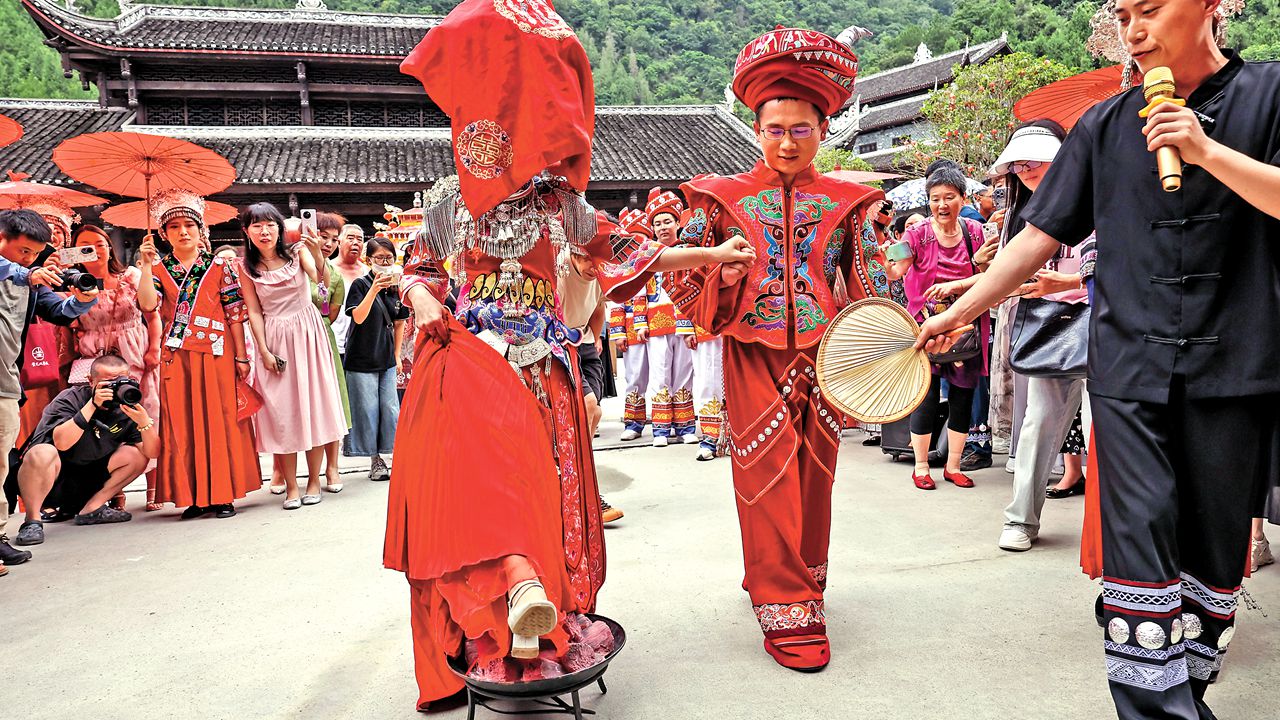Destination weddings popular among the young
Writer: | Editor: Zhang Piaoyin | From: | Updated: 2024-08-12

A newlywed couple during an ethnic Miao wedding ceremony in Pengshui County, Chongqing Municipality on July 20. Xinhua
Forget about the traditional Chinese wedding banquets where guests sit around roundtables in a hotel or restaurant, waiting for over a dozen courses to be served one after another. The guests, consisting of family members, distant relatives, old classmates and current colleagues of the newlyweds, hardly know each other.
This year’s Qixi Festival, also known as the Chinese Valentine’s Day, which fell on Saturday, saw Shi Najun, a wedding planner in Southwest China’s Yunnan Province, busy helping couples from across the country tie the knot.
Shi’s company is based in Lijiang, a popular tourist destination famous for its breathtaking landscapes, including snow-capped mountains and ancient towns rich in ethnic culture. In recent years, the city has become a sought-after wedding location.
Shi planned eight weddings on Qixi Festival, as well as an average of five per day over the three days before and after it. The company has already received bookings for wedding ceremonies on Sept. 9, a date synonymous with “everlasting” love in Chinese, as well as for next year’s Valentine’s Day and May 20, which is pronounced like “I Love You” in Chinese.
Xiao Yu, 28, held her wedding in Lijiang last year.
On her wedding day, Xiao invited only her parents and close friends. After a simple ceremony in the morning, they went on a trip in the afternoon. The six-day destination wedding cost less than 40,000 yuan (US$5,600).
“We work in a first-tier city and are too busy to hold a lengthy and complicated traditional wedding back in our hometown. We don’t want that kind of wedding, nor do we want to place such a burden on our parents and relatives,” Xiao said.
Destination weddings allow couples to tie the knot in a scenic location of their choosing.
In the city of Tengchong, Yunnan, 24 young couples held wedding ceremonies Saturday.
Wei Huantian and her husband recently held their wedding there and embarked on a bicycle tour after a brief and simple ceremony.
“Since we both enjoy traveling and had great experiences in Yunnan before, we decided to have our destination wedding here,” Wei said.
In Dali, one of Yunnan’s most popular tourist destinations known for its natural scenery, historical and cultural heritage, more than 4,400 destination weddings were held last year. About 90% of the couples came from outside the province.
Wang Sihan, a partner at a wedding planning firm in Dali, has witnessed the rapid growth of the industry.
Wang recalled that in 2017, they served only two or three couples each month, but now the average is one wedding a day, with three or four weddings happening on special dates.
“Since 2019, business has noticeably improved. Many traditional wedding planners have tried to woo clients who combine weddings with tours,” she added.
Wang also noted that an increasing number of clients prefer to blend local ethnic culture and historical elements into their weddings. They choose local specialty foods and intangible cultural heritage crafts as gifts to share with friends and family. “The deep integration of destination weddings with local culture and tourism is a new trend,” she said.
On the social platform Red, also known as Xiaohongshu, destination weddings have also become a trending topic, with more than 380,000 posts sharing tips, costs and advice for organizing such events. Besides Yunnan, Xinjiang, Sichuan and Hainan are among the top wedding destinations. (Xinhua)